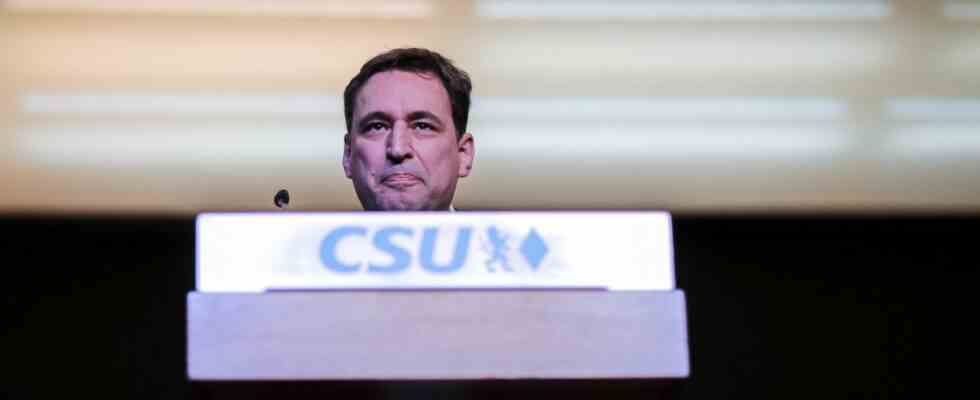Gone in one fell swoop, no longer a member of the Bundestag. When the most important topics of the republic are discussed in Berlin, the Munich CSU only looks on from outside. For the Christian Socialists, this scenario sounds like an apocalypse in the next federal election in 2025, but could very quickly become a realistic scenario if the coalition in Berlin makes a decision.
If the SPD, Greens and FDP implement the planned reform of the electoral law, the CSU in Munich could lose all MPs in Berlin from 2025 onwards. The district head of the CSU and Bavarian Minister of Justice Georg Eisenreich is alarmed. “Politically questionable, constitutionally questionable,” he calls the corresponding plans of the traffic light coalition. The CSU in Bavaria agreed. “We generally reject them.”
SPD, Greens and FDP want to bring the Bundestag back to its normal size, because of the many overhang and compensation mandates, it currently has 736 instead of the planned 598 MPs. These are awarded when the number of direct mandates of a party in a federal state exceeds the number of seats actually won via the second vote. So far, this has often been the case for the CSU.
In the future, as many of their directly elected MPs are to lose their mandates until the balance between the first and second vote is established. The criterion should be the election result in percent. In Munich and other large cities in the Free State, the constituencies are traditionally much harder fought than in the countryside, so the percentage of candidates is lower and the margins smaller.
The CSU sees itself at risk, especially in large cities
If you apply the reform to the past federal election, eleven members of the CSU would have lost their direct mandate. The three deputies Bernhard Loos, Stephan Pilsinger and Wolfgang Stefinger are in first, second and seventh place on the list with the worst CSU results. Other potential victims of the reform would come from Nuremberg, Augsburg and Fürth.
“A massive impairment of the CSU in the big cities” sees Munich boss Eisenreich. He was sure “that this would be legally checked”. The first votes in Munich would lose all their value, and the electoral system would be more difficult to understand. However, easy-to-understand rules are important in elections, as this is the only way to achieve acceptance among the citizens.
As a result of the reform in relation to the 2021 election, Munich would no longer have directly elected MPs in three of four constituencies. The CSU member of the Bundestag in the north, Bernhard Loos, would be directly affected. “That contradicts my democratic feeling,” he says of the plans. “I am firmly convinced that a directly elected MP cannot possibly fall behind.”
Elected as a direct candidate in Munich-West/Mitte with 27 percent of the first votes: Stephan Pilsinger (CSU).
(Photo: Friedrich Bungert)
Elected in Munich East with 31.7 percent of the first votes: Wolfgang Stefinger (CSU).
(Photo: Johannes Simon)
Elected in Munich-North with 25.7 percent of the first votes: Bernhard Loos (CSU).
(Photo: Friedrich Bungert)
He’s not just saying that because he’s affected himself. At the moment it is true that the majority in the Bundestag can decide on such a reform. “But I think that we will go before the constitutional court.” After all, it is not in the interests of democracy that certain parties, especially in large cities, no longer have a chance. Does he want to run again himself? He hasn’t made a decision on that yet, says Loos, 67.
Colleagues Pilsinger and Stefinger also consider the proposal to be democratically questionable. It is “questionable that a candidate who gets more votes in absolute terms in a large urban constituency with more residents than a candidate in a small rural constituency still does not move in because the candidate in the country got a relatively higher percentage but fewer votes ” says Pilsinger.
The Munich CSU Vice Manuel Pretzl calls for a rethink in Berlin. “I think it’s more important that the constituencies are represented than that the election result is proportional to the second vote.” One must therefore rather reduce the compensation and overhang mandates.
The city chairmen of the Greens and the SPD, on the other hand, find the proposal good and fair. All parties would have to give up between 17 and 20 percent of the mandates nationwide, says Green Party leader Joel Keilhauer. Nevertheless, he concedes, there is a possibility that events “take on a different dynamic in the big cities”.
With the proposal, the traffic light coalition in Berlin is only “fulfilling its responsibility,” said Munich SPD chairman Christian Köning. He cannot see that the proposal is a shame for the city as a whole, even if Munich might have a few fewer MPs.
SPD and Greens in Munich can argue from a position of light-heartedness. Both are far from winning so many direct mandates in Bavaria that they too would have prank MPs. The CSU could only solve the dilemma if it wins future federal elections in Bavaria much more clearly than before. Or by getting justice after a lawsuit in court.

